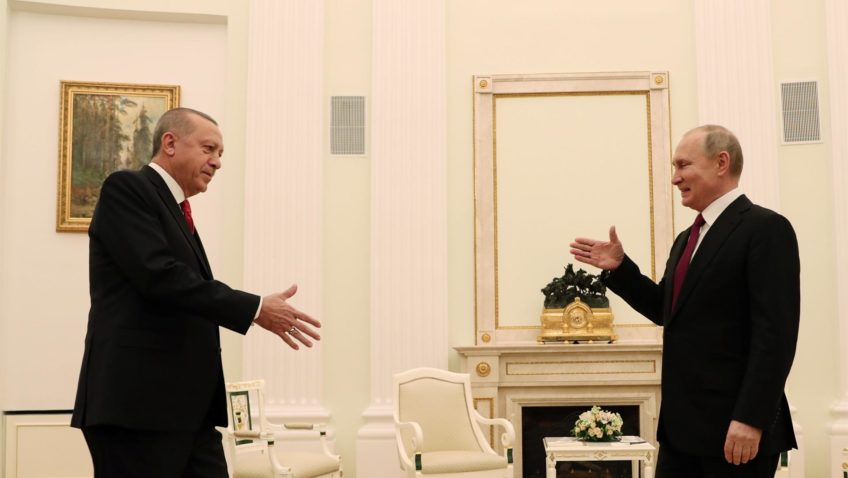Compiled by Eva Jovanova and Hristo Voynov
1. Greece ratified the Prespa agreement! The agreement puts an end to a decades-long dispute over the name of Greece’s northern neighbor, who is now officially renamed into the Republic of North Macedonia. The agreement passed with 153 votes in favor and 146 against. The MPs of the Tsipras’ ruling party, Syriza, were supported by several MPs from their coalition partner, and from Potami. The ratification paves the way for North Macedonia’s integration into NATO and the EU.
2. Russia had a major week for foreign policy. It has become more active in defending its ally, Venezuelan president Nicolas Maduro, who is currently losing international and domestic support over his domestic actions. With the US acting against him, Russia is doing its best to support its Latin American ally. Russian President Vladimir Putin also had a meeting with his Japanese counterpart over disputed islands in the country’s east, a meeting with his Turkish counterpart over Syria and bilateral relations, and a meeting with NATO over the US withdrawal of the INF treaty.
3. Serbian President, Aleksandar Vucic, caused controversy with his speech at the World Economic Forum in Davos in Switzerland. Vucic claimed that he was satisfied with the economic progress his country has made, but not with the media freedom situation, and promised to do everything to improve media freedom in Serbia. Both national and international critics accuse Vucic of hypocrisy and claim he is the reason why media freedom has deteriorated.
4. Further information is coming out regarding the murder of Slovakian investigative journalist Ján Kuciak and his fiancée Martina Kušnírová. Alena Zs. was previously charged for her role in the murder, but further investigation revealed that she was also involved in the murder of the former mayor of Hurbanovo, LászlóBasternák. It was also reported that she was in communication with multiple political figures, some of which are already under pressure over the ties. The investigation has started to look at surveillance of journalists, among others, from various intelligence agents, which is likely to lead to calls for an investigation into over surveillance in the country’s intelligence agencies.
5. Kosovo’s tariffs against Serbia and Bosnia and Herzegovina largely benefit the economies of Albania and North Macedonia. The 100% tax on imports from Serbia and Bosnia that Kosovo implemented in November after not being admitted to the Interpol, resulted in an almost 40% increase in Kosovo’s trade with Albania, and almost 10% increase with North Macedonia. Kosovo’s Prime Minister, Ramush Haradinaj, announced he would only remove the tariffs if Serbia recognizes Kosovo as an independent state, while Kosovo’s President Hashim Thaci announced that he would consider lifting the tariffs as they harm Kosovo. Serbia has not reciprocated the measures.
6. The European Commission has taken three actions against Hungary this week. The most significant is regarding Hungary’s Stop Soros law, which reached the second state of the procedure. The EC has sent Hungary a letter regarding the issues it has with the law, and now Hungary has two months to fix the issues, or be taken to the European Court of Justice. The other two are less significant, including issues over food pricing and failing to implement regulation regarding peoples with disabilities. Meanwhile, Hungary has stated that it refuses to engage in the debate surrounding its violations of the rule of law. It maintains that it is being targeted by the EU for refusing to accept migrants, and this issue is unlikely to be resolved in the two-month deadline.
7. Bulgaria arrested six people for abetting terrorists in Syria. Five of them are in custody. According to the information the Bulgarian authorities have, five Syrians and one Bulgarian helped smuggle one hundred vehicles to Syria and transfer over 25 million Euros illicitly. The Prosecution claims that the group has been operating from 2016 onwards and has developed an underground system of remittances.
8. Ukraine’s former president ousted during the Euromaidan protests, Viktor Yanukovych, has been convicted of high treason for his actions taken to quell the protests. He is still in Russia, and so is unlikely to serve out his 13-year sentence, but the decision is still a major turning point for Ukraine in its efforts to move forward. This comes at the same time as Former Prime Minister Yulia Tymoshenko, who had been jailed in 2011 during Yanukovych’s first year in power, officially declared her candidacy for the upcoming elections. Opinion polls have Tymoshenko in the lead, with actor Volodymyr Zelensky a close second. However he was recently found to have commercial interests in Russia, which will surely hurt his chances in the elections scheduled for March 31st.
9. Croatia is again in the center of Holocaust revisionism. According to Holocaust Revisionist Report, Croatia is one of them most problematic European countries when it comes to historical revisionism. Most state organs have a controversial attitude towards the country’s Holocaust legacy, and the publication of books that rewrite the story about the Jasenovac concentration camp, as well as the continued use of the Ustasa salute, do not help Croatia improve its image.
10. Hungarian opposition parties continue to capitalize on anti-government sentiment from the ‘slave law’ passed late last December. They are encouraging various organizations, including state railway companies and local governments, to not enforce the new law. These efforts coincide with growing protests from various factions of society. The problem with turning these efforts into electoral victories is that the opposition is ideologically split, as many are from leftist parties, while the largest opposition party is Jobbik, a right wing party. Without a joint effort, FIDESZ is likely to maintain a majority, but a joint effort is likely to lead to many unwilling to vote for somebody across the ideological spectrum.


0 comments